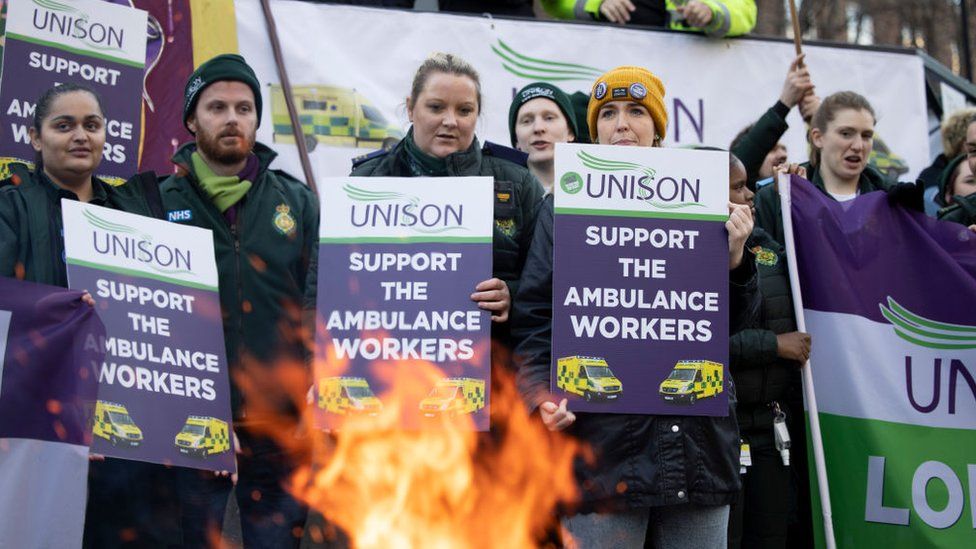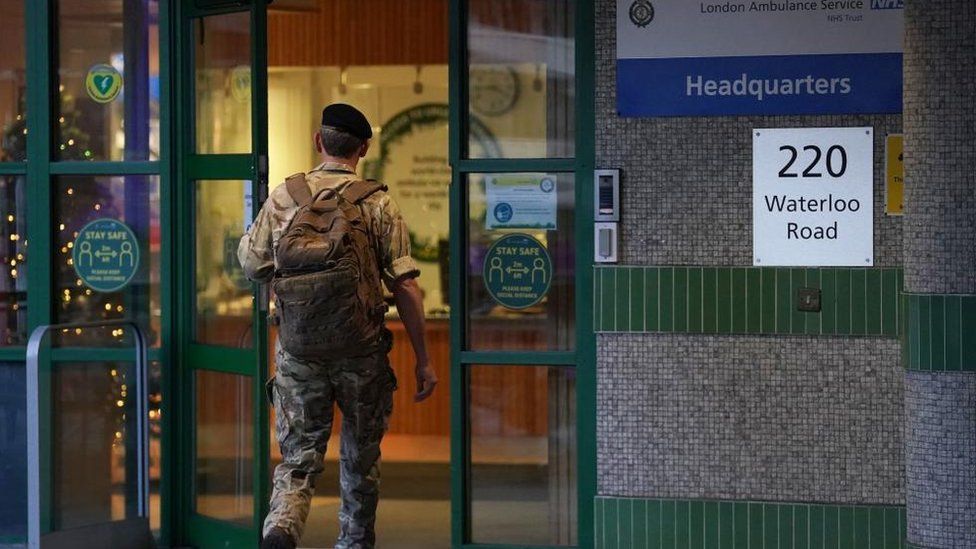
Hospitals were quieter than normal during Wednesday's ambulance strikes, but Thursday is likely to be "very challenging" with lots of patients turning up, health bosses say.
Only the most serious 999 calls were responded to.
But there was no evidence of people going to A&E in taxis or their own cars, NHS Providers told the BBC.
Thousands of paramedics, call handlers and technicians took action in England and Wales on Wednesday.
Saffron Cordery, interim chief executive of NHS Providers, which represents hospital trusts, mental-health trusts and ambulance services in England, said it was still too early to know the full impact of the strike, but she said category-one calls - which are life-threatening situations - "had been answered".
And she said she had heard talk of union members "coming off the picket line" to answer those calls.
But she warned of a rebound effect over the coming days as large numbers of people turn to the health service, pushing up demand to levels similar to the day after a bank holiday.
Thursday and Friday were going to be "incredibly difficult days across the NHS because there is a lot of unseen demand and risk out there", she said.
She said people changed their behaviour on Wednesday, heeding the call not to use services.
"But some will have chosen not to use them at all, even though they need them," she added.
People were also being urged to use their own transport or take a taxi to get to hospital. But Ms Cordery said that "as far as we can tell", people had not been attending A&E in taxis or by their own vehicles.

Andrew Morgan, chief executive of United Lincolnshire Hospitals, said there had probably been more walk-ins on Wednesday.
This can create "more of an issue" because staff do not know people are coming in or what is wrong with them, he said.
Mr Morgan also said Thursday could be a "very difficult day" - predicting that people who thought they should not call an ambulance or should stay away from emergency departments on Wednesday would come in.
A spokesperson for West Midlands Ambulance Service - one of nine where industrial action was taking place in England - said there had been a reduction in calls and staff were grateful to the public for heeding advice to call 999 only in life-threatening situations.
Unions had agreed that ambulance workers would respond to category-one 999 calls and the most serious category-two calls (emergencies, including strokes and major burns) during strikes, but there would be no guarantee of a response to less urgent calls, such as falls.
This prompted Health Secretary Stephen Barclay to accuse unions of taking a conscious decision to inflict harm on patients - an accusation that Unite union leader Sharon Graham said was a "blatant lie".
"The unions have negotiated critical cover, including 999 calls, at a local level with hosts of NHS trusts. That is how it is done," she said.
Rachel Harrison, the GMB's national secretary, said: "In trying to smear decent, hardworking ambulance staff, the government is showing just how out of touch it is with reality.
"Instead of issuing ever more extreme statements that offend both NHS staff and the public, the government needs to grow up and get round the table."
The strikes come at a time when the health service is already under immense pressure.
Lengthy ambulance response times, long delays to hand over patients at A&E departments, and patients not being discharged quickly enough from hospital when they are ready to go home are creating a 'flow' problem, experts say.
Ambulance waits for calls classed as emergencies have doubled in two years - from an average of around 20 minutes to more than 40 minutes. The target is 18 minutes.
There are also record-high numbers of people waiting for operations - now seven million in England alone - an issue that has been made much worse by the Covid pandemic.
Ambulance workers in England and Wales are demanding a pay rise above inflation which they say will improve morale and help prevent staff, faced with rising pressures, from leaving their jobs.
Government ministers though say most ambulance staff have received a pay rise of at least 4%, taking average earnings to £47,000. A further pay increase would mean taking money from frontline services, they added.
More strikes loom
But unions say that unless the government agrees to meaningful pay talks, industrial action could escalate in the new year.
Ambulance staff from the GMB union are already set to walk out in England and Wales again next week, on 28 December.
And Unison - the largest ambulance union with 30,000 members - plans to re-ballot members in Wales and half the ambulance services in England after the turnout in the original vote narrowly missed the 50% threshold required for industrial action.
Fresh votes have also taken place or are planned by the GMB and Unite unions raising the possibility of further - and more widespread - strikes in the new year.
In Scotland, Unison and Unite previously called off ambulance strike action following pay talks.
The GMB union voted to reject a pay deal from the Scottish government - but it did not strike on Wednesday because it was still considering its next steps, and it says it hopes strike action will not be necessary.
Northern Ireland's ambulance service held a 24-hour strike on 12 December.

Have you been affected by the strike? Are you an ambulance worker? Share your experiences by emailing haveyoursay@bbc.co.uk.
Please include a contact number if you are willing to speak to a BBC journalist. You can also get in touch in the following ways:
- WhatsApp: +44 7756 165803
- Tweet: @BBC_HaveYourSay
- Upload pictures or video
- Please read our terms & conditions and privacy policy
If you are reading this page and can't see the form you will need to visit the mobile version of the BBC website to submit your question or comment or you can email us at HaveYourSay@bbc.co.uk. Please include your name, age and location with any submission.
https://news.google.com/__i/rss/rd/articles/CBMiKGh0dHBzOi8vd3d3LmJiYy5jb20vbmV3cy9oZWFsdGgtNjQwNTMwODDSASxodHRwczovL3d3dy5iYmMuY29tL25ld3MvaGVhbHRoLTY0MDUzMDgwLmFtcA?oc=5
2022-12-22 05:21:15Z
1707475855
Tidak ada komentar:
Posting Komentar